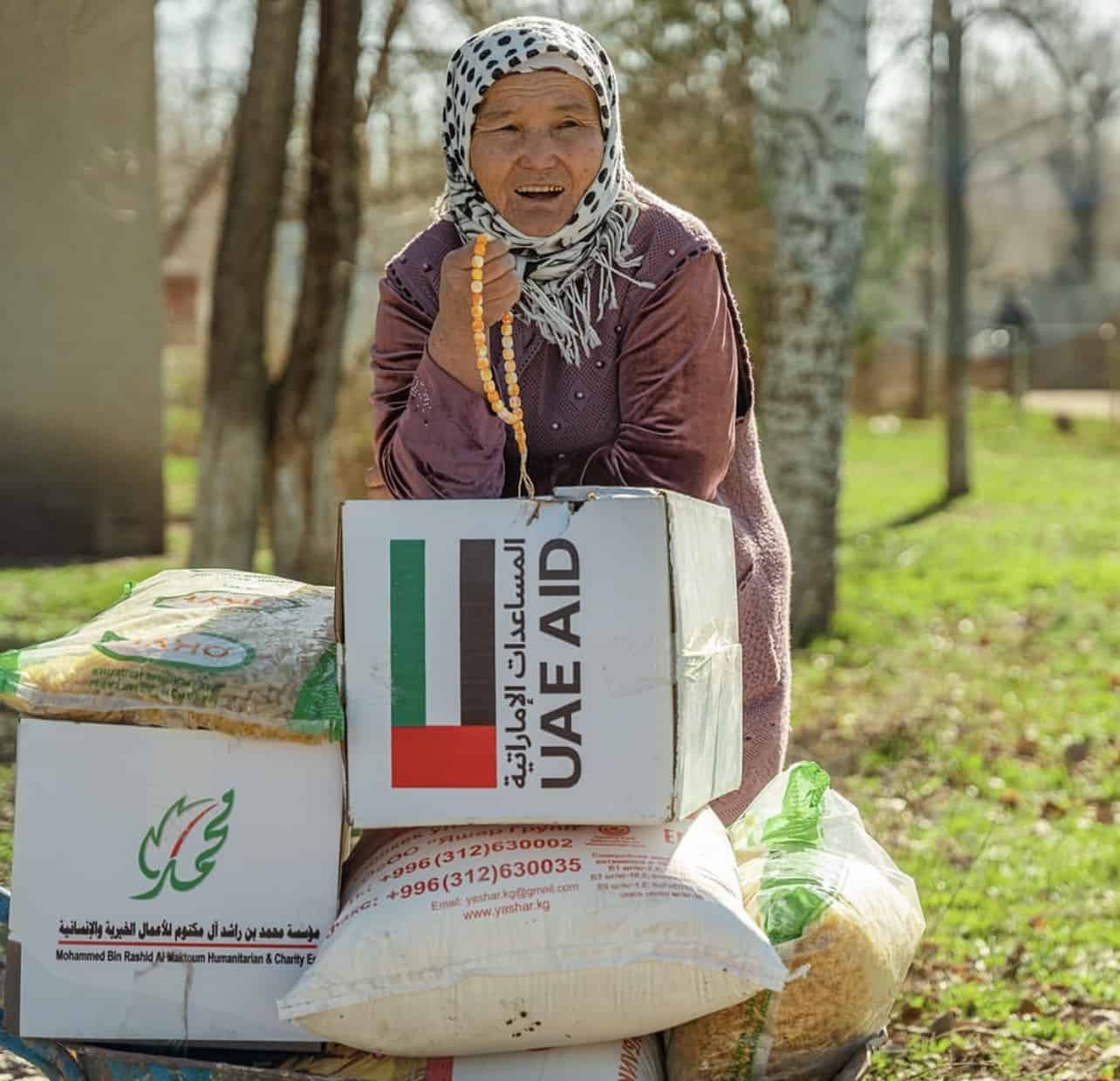Stopping food waste in the world is enough to feed two billion people, and initiatives such as “One Billion Meals” are the first relief

Contributing to the eradication of hunger in the world is a noble goal that the “Billion Meals” initiative implemented by the “Mohammed bin Rashid Al Maktoum Global Initiatives” has set as a top priority by targeting the provision of food support in 50 countries around the world.
On March 10, His Highness Sheikh Mohammed bin Rashid Al Maktoum, Vice President and Prime Minister of the UAE and Ruler of Dubai, announced the “One Billion Meals” initiative to be an extension and development of the “100 Million Meals” and “10 Million Meals” initiatives. After their success in the past two years in contributing to providing a food safety net for the poor and hungry, as a moral responsibility and a humanitarian obligation of the UAE to the world.
Enough food wasted to feed two billion people
Recent studies on the challenge of hunger and food waste revealed that 9 million people die of hunger around the world annually, according to the statistics of the United Nations World Food Program.
At the same time, according to the Food and Agriculture Organization of the United Nations, “FAO,” food valued at more than a trillion dollars, which is enough to feed two billion people, more than double the number of people suffering from hunger and undernourishment all over the world, which confirms that there are There is a growing need for efforts to eradicate hunger, in conjunction with initiatives to stop food waste, to reach the most needy groups.
Statistics indicated that the world wastes about a third of the food it produces annually, as about 33% of the total food produced each year is wasted or spoiled before it is consumed.
8.9% of the world's population suffers from hunger
While studies confirm that hunger is a global challenge that is becoming more prevalent year after year, a detailed report issued by the United Nations stated that more than 690 million people suffered from hunger during 2019, or about 8.9% of the world’s population, with an annual increase of 10 million people. And about 60 million in five years, even before the Corona pandemic.
Today, reports of international institutions specialized in relief work indicate that the number of people suffering from famine or “catastrophic hunger” increased six times during the period from the end of 6 to June 2019 due to the Covid-2021 pandemic and its profound repercussions on the economic and social conditions in fragile and lower-income communities.
Children are among the most affected by the challenge of hunger
A joint report entitled "Child Malnutrition Estimates", issued in cooperation between the United Nations Children's Fund (UNICEF), the World Health Organization and the World Bank, stated that 191 million children under the age of five were affected by developmental disabilities or wasting in 2019 alone due to hunger and malnutrition. .
The state of food security and nutrition
Another joint report entitled "The State of Food Security and Nutrition in the World 2020" was issued by the Food and Agriculture Organization of the United Nations "FAO", the International Fund for Agricultural Development, the World Food Program, the World Health Organization, and the United Nations Children's Fund, and warned that if If rates remain as they are, the estimated number of people affected by hunger by 2030 will reach 840 million people, representing 9.8% of the world's population.
Most affected countries
In its annual international report on hunger crises, the Food and Agriculture Organization of the United Nations indicates that the list of the ten countries with the largest number of food insecure people in 2021 are, in order: the Democratic Republic of the Congo, Afghanistan, Yemen, Nigeria, Ethiopia and Syria, Sudan, South Sudan, the Sahel Group (comprising Burkina Faso, Mali and Niger), and Haiti.
As for the Middle East and North Africa region, the United Nations estimates that there are approximately 55 million people suffering from malnutrition, or 12% of the region's population.
food waste challenge
In contrast to these alarming data that express the depth and breadth of the problem of hunger and food insecurity in the world, the study confirmed that food waste is a major challenge at the global and regional levels, which is confirmed by the Food and Agriculture Organization of the United Nations “FAO”, pointing out that food wasted every year It is worth a trillion dollars, stressing that stopping this waste will lead to preserving enough food to feed two billion people, more than twice the number of people suffering from hunger and undernourishment worldwide.
The report “Food Waste Index 2021” issued by the United Nations Environment Program indicated that stopping food waste can save the planet’s environment and limit climate change and the depletion of its resources, at a time when the world wastes about a third of the food it produces annually, as the same percentage of the total Food that is produced each year is wasted or spoiled before it is consumed.

The report asserts that 8 to 10 percent of global greenhouse gas emissions are caused by food that is not consumed, and if food wasted were a country, it would be the third largest producer of carbon dioxide in the world after the United States and China.
Noble goals for the “Billion Meals” campaign
In light of the aforementioned shocking data on hunger and food waste in the region and the world, the “One Billion Meals” initiative implemented by the “Mohammed bin Rashid Al Maktoum Global Initiatives” aims to invest in the success that exceeded expectations for the “100 Million Meals” campaign that took place last Ramadan. It was able to exceed its goals and collect donations to provide 220 million meals that were completely distributed in a number of countries around the world, and through the “Billion Meals” initiative, the total number of meals will be completed to one billion meals to contribute to the fight against hunger and malnutrition in a number of regions most in need around The world, especially among vulnerable groups of women, children, refugees, displaced people, victims of disasters and crises, meaning that under the “Billion Meals” initiative, donations and contributions will be collected to provide and distribute an additional 780 million meals in dozens of countries around the world.
4 ways to donate
The “Billion Meals” initiative receives donations through four approved channels, which are the website www.1billionmeals.ae And the bank transfer of the “One Billion Meals” initiative account to the approved account number: AE300260001015333439802 At Emirates NBD in UAE dirhams. If you wish to donate one dirham per day to the initiative through a monthly subscription, you can send a text message
with the word "meal" or "MealOn the number 1020 for users of the “Du” network, or on the number 1110 for users of the “Etisalat” network in the UAE. Donations can also be made by contacting the “Billion Meals” initiative call center at the number 8009999.
Expand partner network
In pursuit of the goal of one billion meals, “Mohammed bin Rashid Al Maktoum Global Initiatives” has expanded its network of partners from humanitarian, charitable and relief institutions around the world to include a number of partners and owners of white hands from local, regional and global institutions and institutions, namely: the World Food Program, the network of regional food banks, And the Mohammed bin Rashid Al Maktoum Foundation for Charitable and Humanitarian Works, the United Nations High Commissioner for Refugees, and the Emirates Food Bank, charitable, humanitarian and social institutions in a number of countries.
The “Billion Meals” campaign, which is based on the noble Prophet’s saying “He who is full and his neighbor is hungry” does not believe in me, comes as the challenge of hunger, malnutrition and related diseases around the world causes a child to lose his life every 10 seconds and the death of 25 people daily, including 10 children , while 800 million people around the world go to bed hungry every day, and 52 million people in the Middle East and North Africa suffer from some form of hunger or malnutrition, most of whom are women and children. The campaign also aims to contribute to achieving the sustainable development goals set by the United Nations for the year 2030, including the goal of eliminating hunger in the world.
It is noteworthy that the series of food feeding initiatives organized by the "Mohammed bin Rashid Al Maktoum Global Initiatives" had started in the month of Ramadan 2020 with the "10 Million Meals" campaign, which formed a direct response to the repercussions of the Covid-19 pandemic challenge on the vulnerable and lower-income groups, and formed at that time. A lifeline for many and a message of comprehensive societal solidarity in the UAE with individuals and families who have lost their sources of income due to the conditions and circumstances imposed by the global epidemic, followed in the month of Ramadan 2021, the “100 million meals” campaign, which expanded on a record and exceeded twice its goal of achieving 220 million meals to include many of the Target groups in 47 countries around the world





